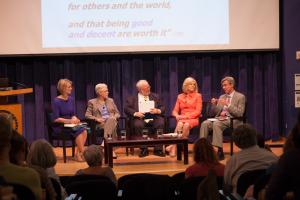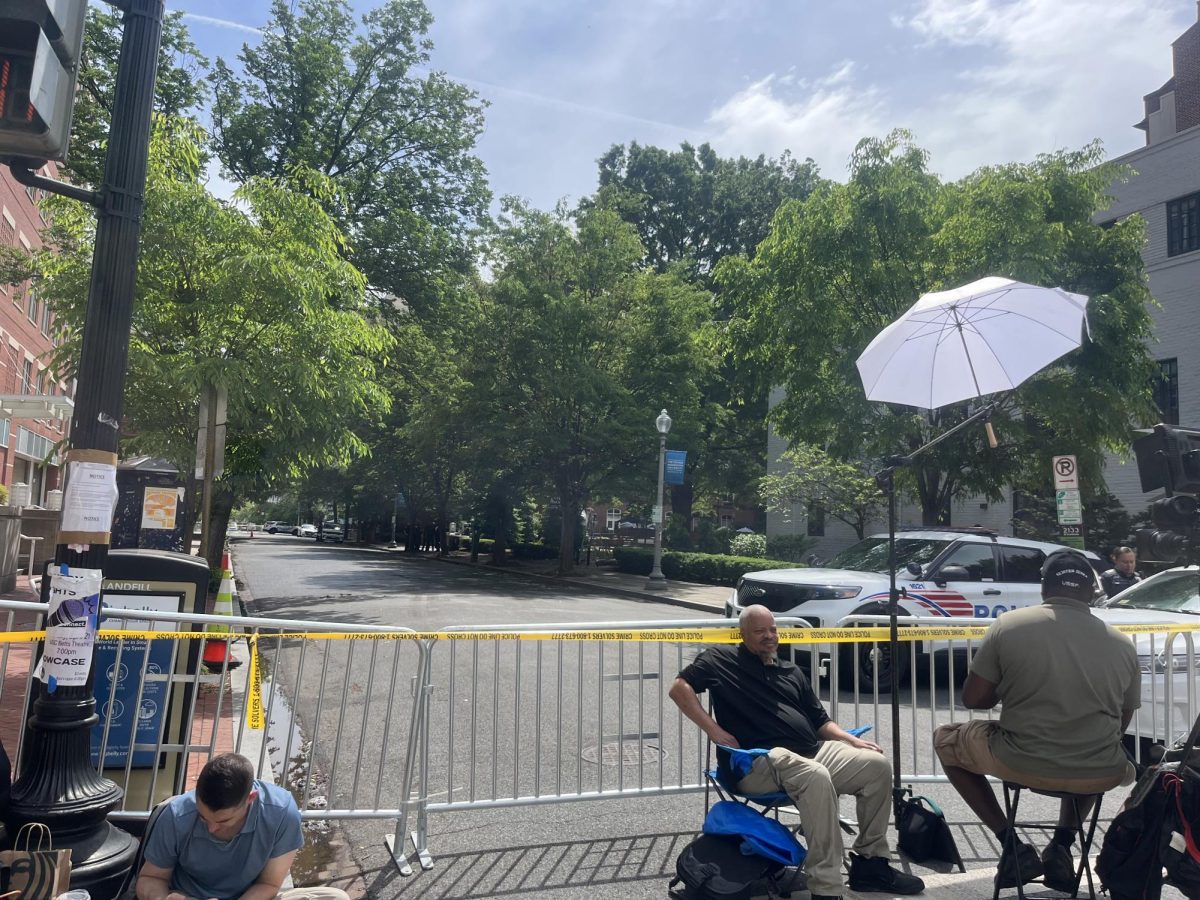
Five panelists discussed the moral and policy implications of Pope Francis’ encyclical on the environment.
Several experts on the Catholic Church and the environment participated in a panel discussion on Pope Francis’ recent encyclical calling for increased efforts to protect the environment in the Intercultural Center Wednesday night.
The event consisted of panelists from both religious and environmental backgrounds, including United States Environmental Protection Agency Administrator Gina McCarthy, Chief Environmental Affairs and Vatican correspondent for NBC News Anne Thompson, professor of moral theology at Fordham University Christiana Peppard and CEO of Public Service Enterprise Group Ralph Izzo.
Georgetown’s Initiative on Catholic Social Thought and Public Life Director John Carr served as the moderator of the panel, which was sponsored by the initiative. Carr began the discussion by giving a summary of the pope’s encyclical and its implications.
Carr stressed the breadth and depth of the encyclical, which covers many issues including climate change, water scarcity and the importance of biodiversity.
“It offers a religious vision. It is deeply spiritual at its core. It offers a moral framework that raises different criteria, different questions,” Carr said. “Despite the headlines, it’s not just about climate. It’s about air and water. In an important section, it’s about work and workers, it’s about cities and species and, as I’ve said, most importantly, [the pope] looks at this issue, as he does all other issues, from the bottom up.”
Carr also lauded the pope’s efforts to instigate an open dialogue on solutions to climate change by calling for as many people as possible to take part in the discussion.
“Climate is a common good, belonging to all, meant for all. So all of humanity has to recognize the need for changes in lifestyle, production, consumption,” Carr said in reference to a line from the encyclical.
McCarthy, who met with Vatican officials earlier this year to discuss environmental issues, said that the pope has brought together the fields of religion and science by finding both moral and scientific motivations for taking action.
“I think one of the most important things to remind ourselves of is that science and religion are not opposites,” McCarthy said. “To paraphrase the great Martin Luther King Jr. … Science is mainly about facts, religion is about values, and they’re not rivals. And in this case, climate [change] is an intersect between those two issues.”
McCarthy then said that the efforts of both the EPA and the Catholic Church fall under the same goal of ensuring a better environment for future generations.
“We are talking about the EPA, whose job [is] to protect public health and the environment, and we are talking about, as Catholics, our charge to protect God’s creation,” McCarthy said. “We are dealing with a moral obligation here. We are dealing with an obligation to protect our children and our children’s future. That is both a religious issue and a public health issue.”
Peppard discussed the social and economic ramifications of climate change that were documented in the encyclical. In particular, Peppard pointed out that the Catholic Church advocates for integral development, in which all aspects of human development are equally prioritized.
“Environmental deterioration is one of the things that holds populations around the world and within the United States back from economic development and from what the Catholic Church has regarded since 1967 as integral development,” Peppard said.
Peppard also said that the encyclical described ecological issues as intertwined with human relationships.
“Ecology is fundamentally the exploration of relationships,” Peppard said. “It’s questions about the relationship of humans to God and our obligations there, of humans to each other and our obligations there, and of humans to the earth and the life processes that sustain us.”
Izzo spoke on behalf of utility and energy companies, whose business interests often pose challenges to environmental protection efforts.
“One of the failures in our system of producing electricity is the absence of a full reflection of the cost associated with the environmental damage that we do,” Izzo said.
Izzo said that he strongly supports the pope’s solution to the problem of cost, which is increasing global access to renewable energy.
“The solution is what the pope suggests, which is to remove the impact on the excluded and to provide universal access to solar [energy] and to energy efficiency through a subsidy mechanism that forces my company to install [energy-efficient technology] everywhere,” Izzo said.
In concluding his commentary, Izzo expressed hope that the encyclical would inspire both businesses and governments to create universal access to affordable clean energy.
“Universal access to renewable supplies and energy efficiency through an investment mandate … will have to come from the government because the market won’t signal the right price. That [is something] I think his encyclical could inspire,” Izzo said.
Thompson, who spoke last out of the panelists, emphasized that Pope Francis’ interests encompass not only the environment, but also the needs of the poor and of developing countries.
“Reaching out to those who suffer, to those who are marginalized, is at the heart of his papacy, and no one is marginalized more by climate change and environmental degradation than the poor,” Thompson said.
Thompson highlighted how the pope sought to encourage the world’s political leaders to make true substantive change through the encyclical.
“The thing that I really was surprised at, in the encyclical, is how he took on the political leaders of this world and he challenged them and said, ‘You’re not being daring enough. You’re not being creative enough. We have a really big problem in this world, and we need better leadership from you. We need courage from you and I,’” Thompson said.




















